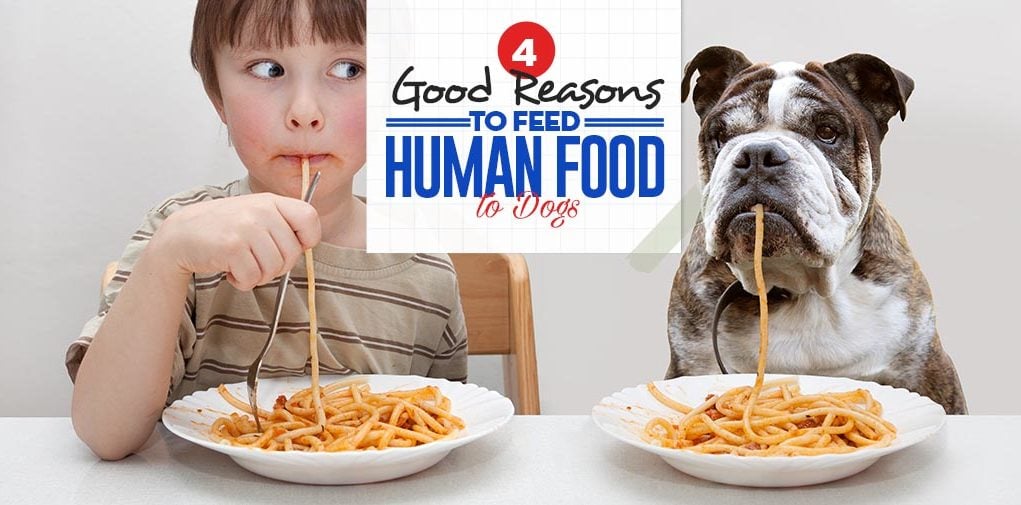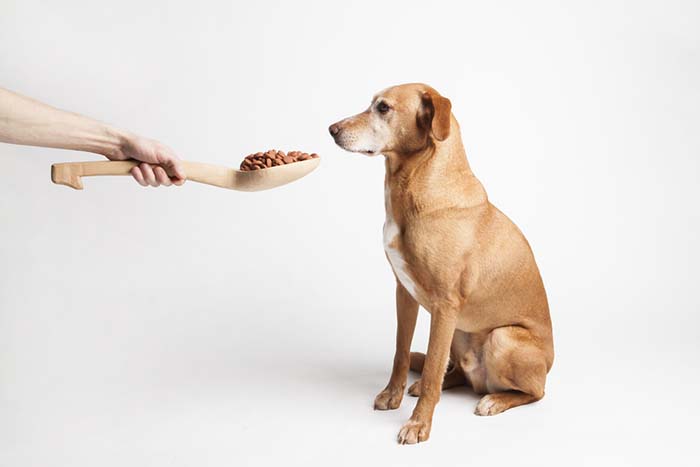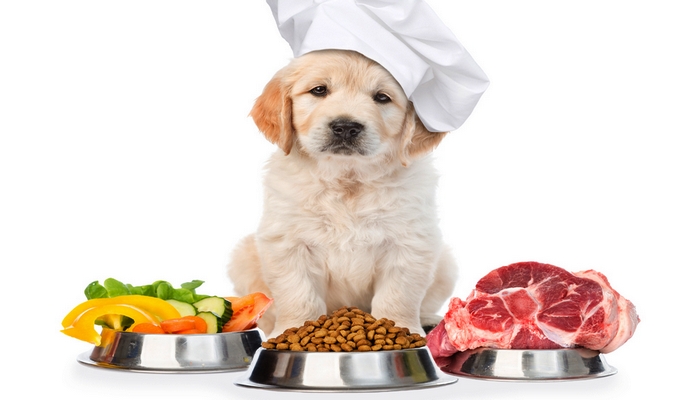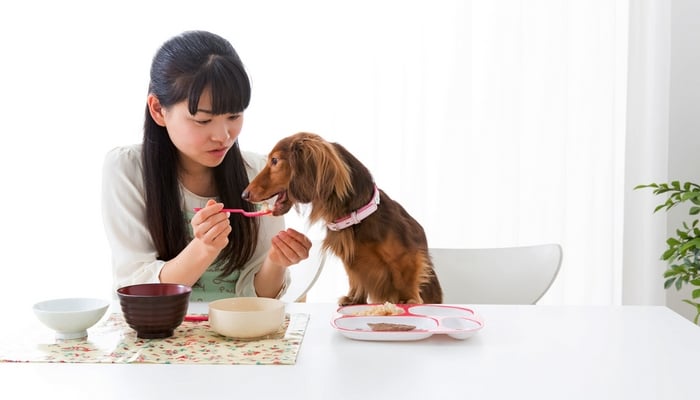At some point during the history that man has shared with their dogs, a rumor was started and began circulating. It would forever change the feeding ritual and relationship between the two species. A nameless and faceless figure of the past insinuated that human food is bad for dogs.
Undoubtedly, whomever they may be, must have forgotten the thousands of years preceding their noble thought when man and dog shared the same food around a fire under a canopy of stars. This man or woman sparked an idea in the minds of dog owners everywhere that giving human food to dogs demeans the animal, which isn't true.
Over the years, we've even given it a special name, “table scraps.” The idea that all human food isn't nutritionally appropriate for dogs is a misconception. It's true that some human foods are really bad for dogs, and we've looked at the science of it before.
However, it's also a scientific fact that some human foods are good for dogs and certain things that we ourselves eat are proven to be superfoods for our canine companions.
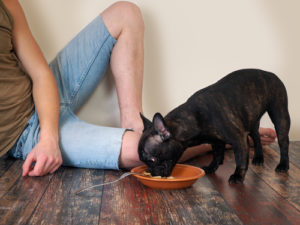 There is no factual evidence to support the claims that dogs should not be fed any human food. It may be that the person that initially thought that dogs should not be allowed human food worked or supported the dog food industry.
There is no factual evidence to support the claims that dogs should not be fed any human food. It may be that the person that initially thought that dogs should not be allowed human food worked or supported the dog food industry.
This may seem like a laughable theory, but when you realize that 96% of all pet owners feed their dogs dry commercial pet foods, things do seem to get a bit suspicious.
In fact, digging deeper into the dog food controversy, in 1964 the pet food industry backed by considerable amounts of money launched a guerrilla marketing campaign to “Ban All Table Scraps From Your Pets’ Bowl!” The campaign aimed to carpet bomb the public consciousness with propaganda using every media source they can access.
Newspapers, magazines, news stations, radio shows and even leaflets all warned that human food was dangerous to feed to dogs. The ads said that the best food you can give Fido was a nice bowl of processed commercial dog food kibble. Needless to say, the campaign touched a nerve in society and was wildly successful.
There are a lot of dog food and feeding myths floating around the internet that need to be taken with a grain of salt. So let's take a look at some, and explore four rational reasons why you should feed human foods to dogs and why homemade dog foods may be superior to commercial dog food brands, and which natural foods are the best for your canine.
RELATED: Homemade Dog Food vs. Commercial Brands – What's Better for Dogs?
4 Reasons to Feed Human Food to Dogs
(and why homemade dog food is better)
Human food, which going forward will be defined as “clean sources of meat-based proteins and some organic plant matter”, is not only fine for dogs to consume but in some cases necessary. Of course, there are some restrictions. Foods like chocolate, grapes and nuts are fine for humans, but we all know that they are toxic and fatal to dogs.
ALSO READ: 16 Things You Didn’t Know About Prescription Dog Food
The human food for dogs conversation must change and evolve to include facts, scientific evidence and actual proven cases. Next time a debate arises regarding dogs consuming human food, refer to the following four reasons you feed your Fido some human foods.
1 Natural is better than processed
Look closely at the kibble manufacturing process, but not too close unless you want to lose your appetite. Corn and ground meat comprise the majority of the kibble. What kind of meat and what parts of that meat were used is not always revealed in packaging, nor do manufacturers clearly disclose that information.
The mixture is ground and heated to a high temperature leaving it looking like grey gruel. It is so foul smelling and foul tasting that fat is sprayed onto the food to entice canines to even take a bite of it.
Does this sound like the kind of food you would want your dog to eat?
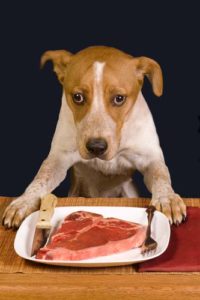 Brace yourselves, for in one such documented facility, undocumented workers load what is essentially a ten foot deep blender with the maggot strewn carcasses of various animals. These include cow and horse hooves, heads and other parts that cannot be sold in grocery stores, whole dead skunks, dead cats and dogs, rats raccoons and other deceased livestock.
Brace yourselves, for in one such documented facility, undocumented workers load what is essentially a ten foot deep blender with the maggot strewn carcasses of various animals. These include cow and horse hooves, heads and other parts that cannot be sold in grocery stores, whole dead skunks, dead cats and dogs, rats raccoons and other deceased livestock.
The auger is then activated and the carcasses, maggots and all, are rendered to remove moisture and fat, leaving an unseemly mass of meat. The “chef” then checks to make sure that the ratio of livestock meat is higher than the rest, because after all, labels only require the manufacturer to declare the dominant animal source. Then the heap is shipped off to be mixed with corn and other grains to be processed into kibble.
Natural food sources on the other hand need not be sprayed with fat for dogs to enjoy. There is some anecdotal evidence that dogs on a natural dog food diet have longer life spans, suffer less illness and disease than their processed kibble chomping counterparts.
Just look at the ingredients of such a diet, which include: meaty bones, lean muscle and internal organs from chicken, lamb, beef, rabbit and pork, along with eggs, milk and fatty fish such as sardines and salmon.
While dogs are mostly carnivorous, they do include in their diet a small amount of plants and root vegetables like spinach, cauliflower, broccoli, carrots and parsnips. And we know that science have shown how many vegetables are good for dogs to eat.
Fresh and dried fruits (excluding grapes, raisins and other toxic fruits) are also viable food sources for dogs. There are tons of fruits and berries that not only dogs can eat, but that could benefit their health immensely, and we've already looked at the science of this.
The best thing about a natural dog food diet is no corn and no disgusting grey sludge is included. You know exactly what your dog is eating without leaving your pup at the mercy of pet food manufacturers whose sole goal are profits; not dogs' health.
RECOMMENDED: 15 Ways to Make Sure Your Dog Gets Enough Good Quality Meat
2 Natural dog food is nutritionally superior
Sugars and carbohydrates are part of a balanced diet in humans. The question now comes to the source of those sugars and carbohydrates. Is it better to obtain them from processed sources such as junk foods and sodas, or from natural sources such as fruits and vegetables?
Without a doubt the majority of all humans on earth would say that they would rather go for the fruits and vegetables as their source of carbohydrates. So, why would humans assume different when it comes to feeding their canines? Processed dog food, whether dry kibble or canned dog food, is exactly that: processed, unnatural, less wholesome and incomplete.
While there has admittedly been few studies done in terms of coming up the definitive effects of a raw food diet in dogs, comparisons can be made with the effects of such a diet on humans. This is evident in the response of the human gut to such a diet. Gut health and the reduction of its inflammation is a primary effect of adopting a raw-natural food diet.
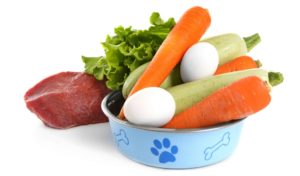 It has been observed that the consumption of refined sugars, usually originating from processed foods high in trans fats and fructose, increases inflammation in dogs and is a known contributor to diseases such as diabetes, heart disease and cancer. In contrast, the consumption of omega-3 fats from natural sources such as salmon and sardines, natural fish oils, decreases inflammation in dogs' gut drastically.
It has been observed that the consumption of refined sugars, usually originating from processed foods high in trans fats and fructose, increases inflammation in dogs and is a known contributor to diseases such as diabetes, heart disease and cancer. In contrast, the consumption of omega-3 fats from natural sources such as salmon and sardines, natural fish oils, decreases inflammation in dogs' gut drastically.
But here's a word of caution on giving your dogs pre-packaged raw dog food. Studies have shown that many of these – but not the majority – commercial raw dog foods available in stores have tested for Listeria, a known food pathogen.
This is only understandable as the freshness of the product invites bacterial growth and the prevalence of it in the food source is dependent on how long it has been sitting in storage. When possible, preparing your dog's food yourself right before it is to be consumed is recommended.
SIMILAR: Is the Raw Food Diet Safe for Dogs?
3 Some human foods are easier for dogs to digest
Once again, parallels can be drawn when it comes to a dogs' digestive system and that of humans. The guts ability to breakdown and metabolize food that has been eaten becomes compromised when processed foods are added into the mix. Processed foods are an amalgamation of natural ingredients (albeit of questionable freshness and quality) and chemical compounds that help stabilize the food and keep it fresh.
Now, when these types of processed commercial dog foods are introduced into the gut, they are broken down into their original components. Some of the chemical compounds in processed foods are toxic and when they accumulate in the body, can cause a host of illnesses diseases and may even prove fatal for your dog. The body may even see it as a foreign invader and illicit an immune response.
However, when ingested, raw and natural foods break down into essential nutrients that the body craves and accepts. The body not only requires less effort to break down these food sources (after all the canine system has evolved for millions of years to do this very thing) and the minerals, fats, proteins, vitamins and carbohydrates from them are readily absorbed into the body.
ALSO READ: 8 Reasons to Feed Your Dog Raw Food Diet
4 There is no such thing as a natural/raw food recall
Let's talk about dog food recalls. You may have undoubtedly heard of one such event or have seen a company being persecuted online because they released a statement that they will be performing one.
In 2007, several companies of well-known processed commercial pet foods released statements that they are recalling entire batches of dog foods due to tainted ingredients.
The raw ingredients originated from China and were highly contaminated with melamine and cyanuric acid that caused kidney failure in both cats and dogs.
While the recall was issued by the pet food industry, it was not fast enough. A number of cats and dogs died due to renal failure. With horrific incidents like the one that occurred in 2007 in mind, and there have been more recalls issues since then, why take the chance? More cases like these were written about in the pet food controversy article.
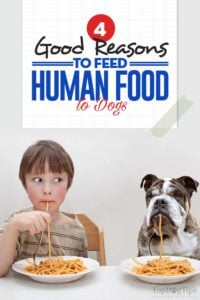 A piece of beef that you butchered and prepared yourself has never been recalled. A carrot plucked from a garden, maybe even your garden, has never been recalled. A meal for your dog that you spent the time butchering, preparing and crafting can never be recalled because it is real, natural food.
A piece of beef that you butchered and prepared yourself has never been recalled. A carrot plucked from a garden, maybe even your garden, has never been recalled. A meal for your dog that you spent the time butchering, preparing and crafting can never be recalled because it is real, natural food.
You know exactly what is being placed in that food, and you know what to avoid and what would be beneficial for your dog's health. Ultimately, if you are not willing to eat it yourself, then why give it to your dog in the first place? The truth is that dogs are dogs and humans are humans. There are cast differences, but in food we share many similarities.
READ NEXT: 4 Most Dangerous Ingredients In Commercial Dog Food (According to Science)


